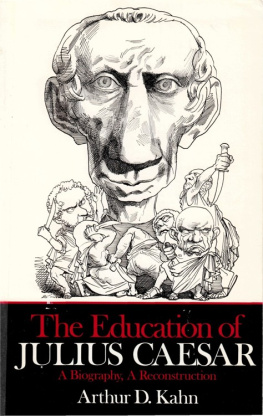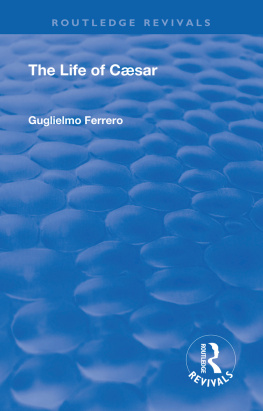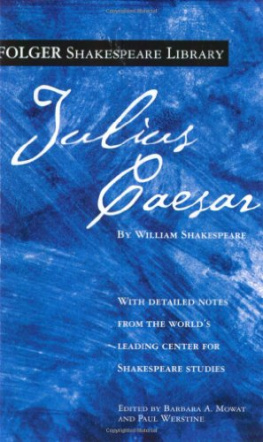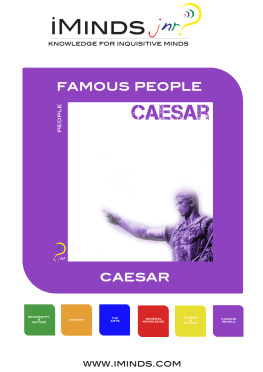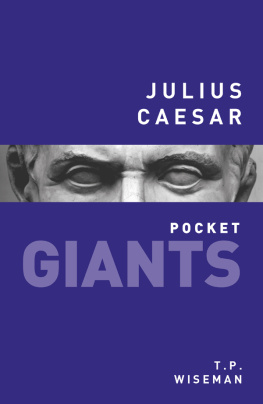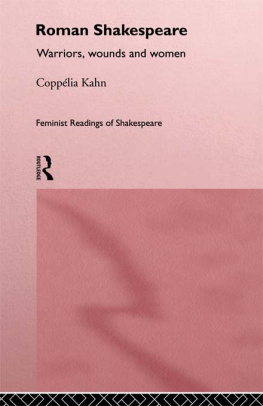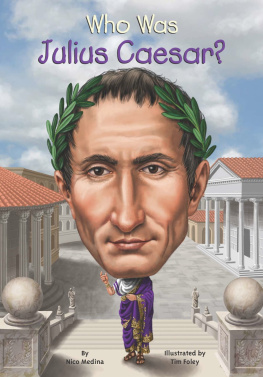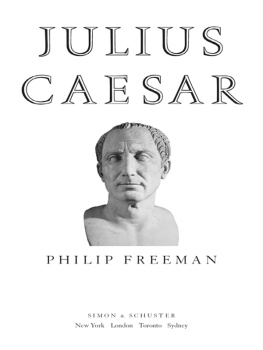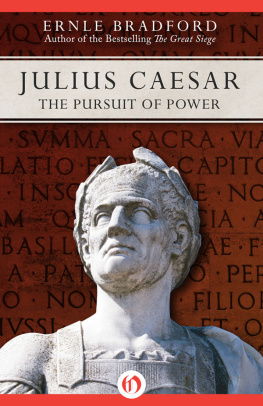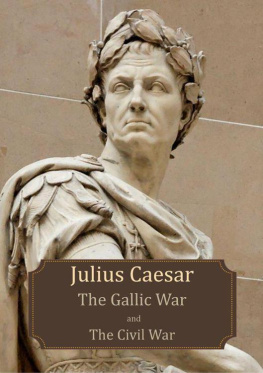The Education of
Julius Caesar
A BIOGRAPHY, A RECONSTRUCTION
Arthur D. Kahn
SCHOCKEN BOOKS NEW YORK
First published by Schocken Books 1986
109 8 76543 21 86 87 88 89
Copyright 1986 by Arthur D. Kahn
All rights reserved
Library of Congress Cataloging-in-Publication Data
Kahn, Arthur David.
The education of Julius Caesar.
Bibliography: p.
1. Caesar, Julius. 2. Rome History Republic, 265-30 B.C. 3. Heads of state Rome Biography.
4. Generals Rome Biography. I. Title.
DG261.K34 1986 937'.05'0924 [B] 85-26148
Designed by Nancy Dale Muldoon
Manufactured in the United States of America
ISBN 0-8052-4009-8
Cover Blurb
Arthur Kahn spent twelve years in the research and composition of this monumental work, very likely the most comprehensive biography of Julius Caesar ever written. He investigated both ancient sources and a great mass of modern historical material to produce a book that proves anew the old saying that each generation must rewrite history in the light of its own times. (Readers will recognize analogies between developments leading to the fall of the Roman Republic and events of the last two generations in the United States.) In The Education of Julius Caesar, Arthur Kahn traces Caesar's education (as Aristotle viewed education) from birth to death. Employing a different sense of proportion from previous biographers in treating the interaction between Caesar's personal life and contemporary events and trends, Mr. Kahn offers a far richer exploration of Caesar's times. Whether investigating the social forces behind the so-called Catiline Conspiracy, tracing the evolution of Caesar's political alliance with Pompey and Crassus or recounting the dramatic conquest of Gaul and the Civil War, Mr. Kahn is mindful that he cannot tell Caesar's story without simultaneously telling the story of the fall of the Roman Republic. He demonstrates, for example, how as a result of early experiences with ferocious civil strife and bloody proscriptions Caesar recognized in his last years the futility of massive retaliation against his enemies.
The author shows how Caesar confronted class and social conflicts arising from advances in technology and the development of a new mode of estate management conflicts particularly between landed senatorial oligarchs and bankers, manufacturers, agricultural entrepreneurs, traders and shipping magnates, who would no longer tolerate exclusion from imperial decision-making. Ironically, as Mr. Kahn recounts, the man who strove to save the Republic through reform was fated to preside over its demise.
While delineating with impressive insight the political skills, showmanship and mastery of propaganda as well as the military genius of his subject, Mr. Kahn also reveals Caesar as a man of surpassing personal charm, extraordinary learning and cultivated tastes. With a profound appreciation of the Greco-Roman civilization epitomized in Caesar, the author illuminates for the reader why critics from Montaigne to the present have considered "that Caesar deserves to be studied not only for the knowledge of history but for himself, so much perfection and excellence has he above all the others."
Jacket illustration by David Levine
" ... he doth bestride the narrow world
Like a Colossus, and we petty men
Walk under his huge legs and peep about
To find ourselves dishonourable graves."
Julius Caesar I, ii
"This is by no means a dry-as-dust bare skeleton of history but a lively and imaginative reconstruction of the events of this dramatic period ... the work of an interesting mind that knows how to compel conviction, not without introducing a measure of spicy provocation."
MICHAEL GRANT, distinguished British historian and author of numerous books on the Classical world
"Arthur Kahn skillfully combines erudition with popularization to make the last century B.C. come grippingly alive for his readers."
E. T. SALMON, Canadian historian whose scholarly works on ancient Italy have won international acclaim
"Kahn's work ... brings Caesar alive and clings to the spirit of his age with integrity ... The presentation adds so much to the details that ... it's by far the best read."
KIRKUS REVIEWS
CONTENTS
Preface
IN 1921 Matthias Gelzer, dean of German historians of Rome, published a biography in which he assembled all the reliable source material about Julius Caesar. Reissued in numerous editions and translated into English, this work remains a standard reference. Scholarly, precise, extensively annotated, cautious in interpretation and chary of speculation, Gelzer's work does not require redoing, and in this book I have sought rather to explore the interaction between Caesar and his times and to define how the times shaped him and set the direction of his career; and how, in turn, he shaped his times and helped to redirect the course of history.
Such an objective presupposes an investigation of all aspects of life during the last years of the Roman Republic.
Since the publication of Matthias Gelzer's biography of Caesar more than sixty years ago, historians have elaborated or rendered more precise new disciplinary approaches to the analysis of past societies anthropology, sociology, econometrics, etc. On the Late Republic there has been a spate of studies on the roles of women, slaves, bankers and freedmen along with investigations of working conditions, technology, land use and military recruitment. ) Recently psycho-historians have sought new insights into the past through psychological interpretations of motives and actions. For Caesar's early years a cautious application of the theories of Erik Erikson (a founder and leading exponent of the psychological investigation of history) regarding crises and incremental psychological adaptations within life cycles as well as the insights in his psycho-historical studies of Gandhi and Luther offer modes for amplifying the data in ancient sources.
A scholar's initial impression is of astonishment at the amount of ancient source material for the Late Republic. Further probing, however, exposes major gaps in documentation, a paucity of specific data and a necessity for creative reconstruction. Ancient historians vary, of course, in reliability and all reflect the influence of their rhetorical training, but even the least precise of them possessed an abundance of primary and secondary sources and a sense of the times that modern historians cannot hope to recapture, and all must be utilized. )
In any comprehensive exploration of the interaction between Caesar and his times a biographer must be bold in speculation, and, indeed, Michael Grant, the distinguished British historian, proposed defining the book as "a biography: a reconstruction." This is an appropriate description, and one that enjoys the sanction of the greatest historian of antiquity, Thucydides, who in the preface to his Peloponnesian Wars advised "the reader [to] consider [his] reconstruction, based on the clearest evidence available, as accurate as can be expected for ancient history."
In approaching the problems in such a reconstruction, I have sought guidance in Isaiah Berlin's counsel that "historians [who] have commanded the most lasting admiration are neither the most ingenious, nor the most precise, nor even the discoverers of new facts or unsuspected causal connections, but those who (like imaginative writers) present men or societies or situations in many dimensions, at many intersecting levels simultaneously: writers in whose accounts human lives and their relations both to each other and to the external world, are what (at our most lucid and imaginative) we know that they can be." ) As for concerns regarding scientific objectivity and precision (particularly acute in history based on limited sources), the late British historian Edward Hallett Carr offered a commonsensical and profound observation:
Next page
